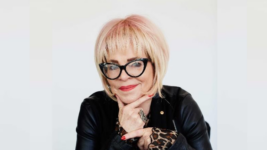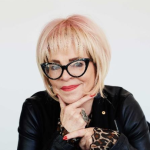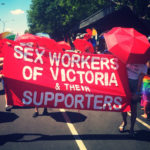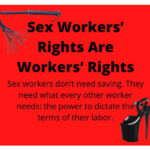In Our Blood: Sex Worker Rights Advocate Julie Bates Reflects on the ABC Miniseries

This Sunday night sees the ABC screening the first episode of the four part miniseries In Our Blood, which is a depiction of how the Australian government handled the HIV/AIDS crisis of the 1980s, with the government approach taken having been lauded the world over.
The series revolves around Bill Bowtell, then advisor to Australian health minister Neal Blewett, and it portrays how the crisis affected the LGBTIQ community.
In Our Blood further considers the public panic with the onset of the virus and the divisive sentiment propagated by moral crusaders of the time.
Indeed, the HIV/AIDS epidemic altered our society as the health of marginalised groups, such as the LGBTIQ community, sex workers and people who use drugs, became of pivotal importance, and this opened the way for advocacy and peer-led groups, along with support services, that now exist.
In her recollection
Julie Bates AO provided feedback on the early drafts of the script of In Our Blood. Back in the 1980s, Bates was a key advocate in both the sex worker and people who use drug communities.
Indeed, Julie was the first manager of ADIC or today’s NSW Users and AIDS Association (NUAA), and she was also the initial in-house manager of the Australian Prostitutes Collective NSW, now known as Sex Workers Outreach Project (SWOP).
Bates was awarded an Order of Australia in 2018, for her “distinguished service to community health, particularly through harm reduction programs,” peer support and empowerment initiatives for sex workers, people who use drugs and those living with HIV/AIDS.
A tireless advocate for the rights of those working in the sex industry, Bates has further penned a review of In Our Blood, and she states that the series “does justice to this history on a number of levels, especially the collaborations in Canberra that led to the bipartisan response”.
Sydney Criminal Lawyers spoke to Julie Bates AO about her recollections of having lived through the HIV/AIDS crisis, the importance of the input from affected communities during it and what society could learn from those times today.
The ABC miniseries In Our Blood portrays the Australian government’s approach to the HIV/AIDS crisis of the 1980s. And it’s about to premiere this Sunday night.
Julie, you were involved in the early days of the project and have reviewed it prior to airing. So, why would you say this miniseries is important?
Being mostly a glass half full kind of person, I tend to look for positives in people and things.
There are clearly some positives in this production, and it’s important on a number of levels, especially the collaborations in Canberra that led to the bipartisan response that Australia is much lauded for.
This includes the behind-the-scenes conversations across party lines, the safeguarding of the blood supply, early research initiatives, the role of affected communities and the ultimate funding of community groups, all leading to our world renown successful response to HIV.
But, above all, it keeps this story alive.
In your review of In My Blood, you mention those who “lived through those distressing times”. You’re one of those people. So, what was it like living through the crisis?
This is a seriously difficult question bringing a seriously mixed bag of emotions and memories flooding in.
When thinking about those times, I think firstly of the fear and loathing and ignorance expressed in many quarters of the community, some of whom should have known better.
As my friend and colleague from the day, nurse Lizzie Griggs, of the famed World First AIDS Bus, sums up so well, “I was initially stunned at the public’s reaction to AIDS. Such ignorance, hatred, fear. People saying shockingly hateful homophobic things.”
“That made me even more determined to work in HIV. I wasn’t scared and was happy to be a warm welcoming face for those communities being vilified.”
The distress I speak of, caused by fear and loathing and draconian laws, played out in many settings, including in the health care sector.
In hospitals, patient’s meals were left outside the ward despite the fact that many were unable to walk, see or get out of bed to collect their meal.
I distinctly remember a call from a distraught friend, who eventually died of AIDS-related causes, relaying how gutted he was, when returning from his lunchbreak in the public service, to find people disinfecting his phone and desk. The word was out that he was HIV positive.
Double bagging of people following their death meant significant others could not look upon their loved one to say that last goodbye.
Funerals of loved ones sometimes completely sanitised beyond your ability to recognise the person as the “traditional” family had created an imagined story neglecting all of the most precious human things about the person.
Some people will recall attending three or more funerals in a week.
Of the treatment generally of people perceived to be vectors of HIV, there were eggs being thrown at sex workers from passing cars, blood red signs painted on the walls of homes of people presumed to be living with HIV wishing the person to die and a family so vilified due to the positive status of their young daughter, they had to leave Australia.
There was the idea that HIV positive people should be locked away on a deserted island, and a sex worker being detained under the Public Health Act, for what turned out to be, the remainder of her life.
These are just some of the hurt and damage of the day that activism helped overcome.
I also remember the courage and humanity, the fearlessness, fighting and challenging the status quo, of legislative challenges, of demonstrations demanding more hospital beds so people weren’t left in corridors, drug trials and the release of new treatments and antidiscrimination protections, innovation, friendships and alliances never before seen.
But if anything characterised those early years, it was the camaraderie.
And yes, fun, as my dear Lizzie again so eloquently describes, “It was a time of lots of fun and laughs and tears. Losing friends and colleagues along the way.”
“It’s hard to describe. How can you have so much fun in such a tragic time? But the people living with HIV or AIDS were the ones fighting to have the best life they could… they kept me laughing.”
Then, to the overwhelming sorrow that still lives within many of us who survived those times.
Of witnessing so much suffering, losing friends and partners, patients and colleagues, of caring for people, friends and patients, as you watched their lives slipping away in the most horrific of circumstances.
You acted as an advisor on the early scripts to the series. What sort of aspects of the crisis or scenarios that occurred did you feel were vital to be included?
I wouldn’t call myself an advisor. Clearly, I wasn’t paid for any of my contributions but that has never stopped me from wanting to get the best out of people and projects.
It certainly was important that the government response be included and that it was accurate. On a first read of some of the scripts, it seemed to me that men in suits were being quite well depicted, so I largely focused my attention on my area of expertise, the community response.
From my first contact with the writers, I pushed for a more inclusive and respectful depiction of the vital role of affected communities and the early unique and community-based initiatives.
That the characterisation of the real people, who did the heavy lifting, was honest and honoured.
While disappointed that the broader community response that includes initiatives undertaken by people who use drugs and their allies, and other unique world first initiatives, is not included, I was glad to see the writers had, at least, taken on board my criticism correcting their earlier pejorative representation of sex workers.
The sex worker character now comes across as a feisty, smart woman representative of the vital work sex workers were doing in getting condoms into brothels – and on to their clients – while encouraging better practice from brothel owners and advocating for law reform. It was a major win.
The series shows how Australia became a world leader in its approach to HIV/AIDS, with a focus on how it affected queer communities.
However, you were quite active in terms of the approach taken within the sex worker community and amongst people who use drugs.
Can you talk about those aspects of the crisis?
Clearly, as the evidence shows, sex workers and people who used drugs and their allies were a vital part of the response, and from the earliest days of the epidemic, were actively engaged in community development and forming alliances and, in the case of sex workers, reinvigorating their existing organisation with a specific focus on HIV.
In fact, the birth of the harm reduction movement, as a counterbalance to the war on drugs and the susceptibility to HIV, can be traced to early activists and allies within the Australian and global drug user rights movement.
It must be remembered, this was a time when sex work, or the more pejorative term “prostitution”, was deemed self-destructive behaviour, a form of self-harm and generally a metaphor for all kinds of ills – mental, moral and physical – along with an out-of-control police force feeding off criminalisation.
The treatment of people who used drugs didn’t fare any better. If you happened to belong to both camps, you were in for a rough ride through the system.
Before HIV and services – like the KRC primary health care centre, the AIDS Bus, drug user organisation ADIC/NUAA, sex worker organisation APC/SWOP, AIDS organisations Positive Life and ACON and new age sexual health services – clients of the caring profession were largely to be seen and not heard, like little children or, at best, admonished for their choices.
There was never any notion that the person should have a voice, that they would be at the centre of any decisions relating to their health and their lives, that services would be listening, problem-solving together, sharing ideas, sitting on high-ranking government committees together and even working with peer-led clinical services as we have today.
Memories of those times still resonate with me, and why we needed to shake up the caring profession to be truly caring and respectful of lifestyle and occupational choices and having a say in our treatment whilst working on law reform.
HIV and HIV activism changed the status quo and many health/welfare services today have consumer representation within their ranks and function within a person-centred framework.
SWOP (Sex Workers Outreach Project) and NUAA (NSW Users and AIDS Association) each continue to respond to existing and emerging issues for their constituents with substantial recurring government funding.
And, significantly, we saw decriminalisation in the NSW sex industry. There is much to be proud of. It is some of these stories I would have liked to have seen depicted in the subject series.
And lastly, Julie, how do you consider this story reflects on the current political and social climate in this country? What could be learnt from the approach of the 1980s?
In some respects, I feel our progress has slowed. As a country, we have rested on our laurels, so to speak.
For instance, despite the evidence to prove their efficacy in saving lives, we only have two supervised injecting centres in the whole of Australia.
On the positive side, sex work-related law reform has picked up speed with the decriminalisation of sex work in Victoria and the Northern Territory and hopefully, Queensland will soon follow.
Repealing the remaining draconian laws and restrictive regulatory framework in sex work and in drug use, has a way to go.
This requires continuing advocacy for sensible public policy that requires governments to listen and learn from impacted communities that, save for a couple of exceptions, they mostly did through the 1980s.
While it is important to learn from our past, we must remain vigilant in the present and whenever you see ideology being used over evidence, you must call it out as we did back then.
A key lesson from our approach of the 1980s is to allow health promotion initiatives to be community-driven and for services to be person-centred.
Perhaps, if they had taken a leaf out of our 1980s song book, the COVID pandemic might have been better managed.
Finally, for a society to be truly humane, governments must not only continue to listen and learn but lead through inclusion, empowerment, accountability, courage and humility: the five best practice pillars attributed to feminist leadership.







